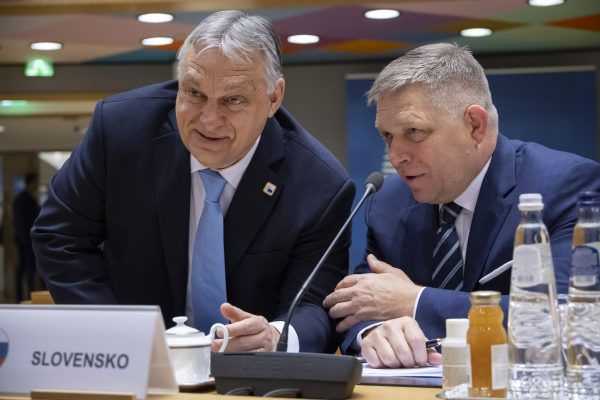There is now a school of thought in Russia that the presumed assassination of Yevgeniy Prigozhin, and Vladimir Putin’s conspicuous absence from his funeral, may suggest the country’s leader has abandoned his reliance on radical war supporters. Instead, they think, he is opting for an apolitical but obedient bureaucracy managing a submissive but amoral people.
This argument has been expressed by a number of independent political scientists, who say that Putin used the radicals for as long as he needed, but subsequently distanced himself from them. This is not universally accepted — others believe that although Putin had to slap down the ultranationalist extremists, he cannot simply abandon the “jingoists” and is doomed to rely on them by the very logic of the war he unleashed.
The first version is also shared by pro-Kremlin sociologists, who assure us that the war ultras demanding greater involvement of the state and society in the war “have been largely depleted over the past year.” In their words, this group, “is now undergoing the same processes of degradation that once affected supporters of the non-systemic opposition or systemic liberals.” Society at large meanwhile remains essentially apolitical, but more patriotic. Kremlin court sociologists refer to this process as “a framework and gradually enveloping ideologization of Russian society” and urge the authorities to rely on it.
It is far from clear this is true and is not helped by contradictory themes in official propaganda. On the one hand, nuclear hysteria remains a regular feature of the most-watched political TV shows with calls to strike Polish or British cities, or some “target” in Ukraine. Until relatively recently, the well-known political scientist and co-founder of the Council on Foreign and Defense Policy, Sergey Karaganov, also suggested inflicting a “pre-emptive and retributive nuclear strike” on Eastern Europe.
“Only if a madman sits in the White House and hates his own country will America resort to a strike ‘in defense’ of the Europeans, incurring a response and sacrificing a conditional Boston for a conditional Poznan,” he averred.
On the other hand, there has recently been an outpouring of considerably more pacific articles on the website of the Valdai Discussion Club, Putin’s favored think tank. It is a strange grouping; once offering somewhat more thoughtful analysis than tub-thumping state propaganda, before sinking into loyalist Kremlin-speak once the all-out war began in 2022.
Now that may be changing. It has published an article noting the importance of groupings such as the Nuclear Five, that is the nuclear-armed states that compose the United Nations Security Council. Its authors positively assess the thesis of a speech by US National Security Advisor Jake Sullivan which suggested areas of cooperation within this group. Valdai experts have also noted the need to find ways to reduce strategic risk and de-escalate tensions between nuclear powers.
Similarly, a possible change of tone may be emerging in the state propaganda narrative. On the one hand, Putin himself has said more than once that the West is exploiting Ukraine “as a training ground and battering ram against Russia.” The country’s main enemy, according to this logic, is the West, which is using Ukraine as a means to achieve its goal.
However, a new theme has emerged in the propaganda media recently arguing the opposite — the West is not manipulating Ukraine, it seems, instead Volodymyr Zelenskyy is blackmailing a West that is quietly willing to abandon Ukraine and pursue peace negotiations with Moscow.
This may be an expression of Kremlin hope rather than reality, even if the arrest of the war criminal and government critic Igor Girkin (Strelkov), and the apparent liquidation of the mutineer leader Prigozhin makes clear to the ultras that the Kremlin makes the decisions on peace and war.
Such changes in propaganda may just be continuing attempts to lure the West into a discussion on what it is willing to offer Russia to reach a “settlement.” But it would be terribly naïve to think that Putin will abandon the war because it is this which consolidates popular support around the regime. A decrease in militarism and its accompanying background music from amplifying propagandists would inevitably create a societal quiet in which — at some point or other — citizens would focus on the country’s enormous problems, including the cost of living issues, and ask who was to blame.
Such trends were evident, for example, following the unpopular pension reform or during the coronavirus pandemic. The continuation of the war implies a further reliance on the radicals, even as the Kremlin strives to bring them under control. The “framework ideologization” of society simply cannot replace the value of truly staunch war supporters.
Meanwhile, even loyalist Kremlin sociologists admit that the war is the cause of growing anxiety among ordinary Russians. The main cause of concern is the growing wave of Ukrainian attacks on Russian territory, causing damage to valuable military assets and regularly disrupting daily life (for example, causing the repeated grounding of civilian airliners at Moscow airports.) Even if the West did decide to negotiate with the Kremlin over the head of Ukraine’s government, these attacks would not stop. Moreover, the ultras would certainly describe such negotiations against the backdrop of the war as a betrayal, an opinion even ordinary people might come to share.
That does not augur a return to the policy of pre-war days; it suggests the Kremlin will have little option than sooner or later to intensify the conflict and appease the jingoists. As Andrei Soldatov and Irina Bogoran similarly concluded, sooner or later Putin will need to conjure up a new Prigozhin.
Kseniya Kirillova is an analyst focused on Russian society, mentality, propaganda, and foreign policy. The author of numerous articles for the Jamestown Foundation, she has also written for the Atlantic Council, Stratfor, and others.
Europe’s Edge is CEPA’s online journal covering critical topics on the foreign policy docket across Europe and North America. All opinions are those of the author and do not necessarily represent the position or views of the institutions they represent or the Center for European Policy Analysis.





